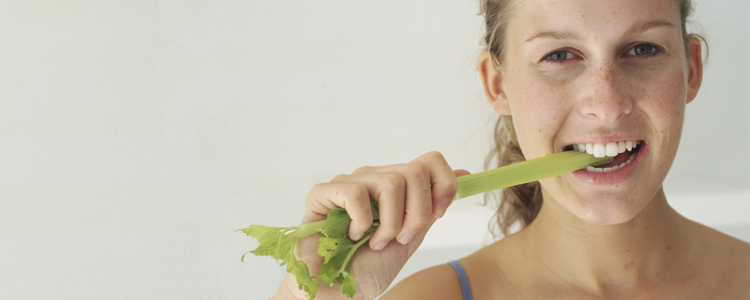When Does “Healthy” Eating Become Dangerous?
In a society so obsessed with health, when does striving to be “healthy” become dangerous? When does it turn into a problem? Many people are familiar with the more commonly known eating disorders – anorexia nervosa, bulimia nervosa, and binge eating disorder, but most people don’t know about another serious eating disorder: orthorexia nervosa. Orthorexia, while not yet an official diagnosis in the DSM-5, is a life-threatening problem that requires treatment.
Orthorexia nervosa is defined as a “fixation on righteous eating.” There’s a preoccupation with the quality and purity of the food you are consuming; an obsession with being “healthy.” In other words, orthorexia is when you are so obsessed with food being clean, raw, fresh, organic, GMO-free, etc., that it interferes with your quality of life and ability to engage in social eating events. Orthorexia is when wanting to be so pure and righteous leads to important nutrients being excluded and your mental and physical wellbeing being negatively impacted.
If we take out the words like fixation and obsession, orthorexia can sound like a “healthy” way to live, but don’t be fooled, for this is not the case! Orthorexia can cause severe weight loss and health concerns. Orthorexia is a perfect example of how too much of even something seen as beneficial can be detrimental.
Everyone’s brain takes in and processes information differently. A typical brain can understand and orchestrate concepts such as balance, flexibility, and moderation. A brain with more obsessive tendencies has trouble finding the middle ground. If you have orthorexia, you might hear that cardio is good for the heart, and now you find yourself compulsively exercising to an unhealthy extent. If you succumb to black-and-white thinking, you may hear that carrots are good for eyesight and that thinking drives you to eat a certain amount of carrots daily. Now, you cannot miss a day at the gym or have a meal without incorporating carrots! This rigidity makes it difficult to live a full life.
There is a certain pride that comes with orthorexia, almost a badge of honor. There may be a feeling of superiority in that you are eating and exercising in the best way possible and no one else is doing as great of a job as you are. It is an external way of elevating an often low sense of self. There may be an initial increase in self-esteem, but usually it will not last as there is always something more you could be doing, a way to be even “healthier” and therefore more righteous and perfect.
Orthorexia is a very scary disorder, and it often starts from a simple, seemingly-harmless diet. Society tends to praise those who include or exclude certain foods; it may even seem to most people that someone in the beginning stages of orthorexia is improving their lifestyle and making healthier choices. The “dieter” is revered for what is perceived as discipline. At first it may be hard to realize there is an issue, but it soon becomes clear that you have a problem on your hands when you can no longer go to your friend’s house for dinner or eat at your favorite restaurant.
As you become more and more obsessed with being pure, your diet becomes very restrictive. Over time, we see a decrease in variety and caloric intake, which can lead to social, physiological, and medical complications. Your health becomes compromised when suffering from nutrition deficiencies and when your body systems and organs are not getting enough energy. What started out as a way of being “healthy” has become the very thing that is causing harm. In addition, when you’re suffering from orthorexia, or any eating disorder, the quantity/intensity of exercise tends to creep up to an unhealthy amount. Excess exercise becomes that much more harmful for your depleted body.
When does wanting to be pure and eating healthily turn into a disorder? Here are some red flags to help you recognize the signs of orthorexia:
- The avoidance and ultimately the elimination of certain types of food that the sufferer may not view as “pure” such as artificial colors, flavors, and preservatives, and foods that may have been genetically or chemically modified or treated with pesticides
- The avoidance of certain food groups that society has deemed “unhealthy”
- A decrease in variety of foods
- Weight loss
- Refusal to eat food for which they are unclear about preparation or what it contains (ex: at a restaurant)
- Refusal to eat food they have not prepared themselves
- Refusal to eat foods that weren’t produced or prepared in a way they consider pure (ex: food must be farm to table)
If any of these signs sound familiar, it is crucial that you reach out for help. It is also important to talk to your loved one if you believe they are suffering. Orthorexia is a serious disorder that requires professional help. Finding a therapist and/or nutritionist who specializes in eating disorders is a great first step. From there, your practitioner can help set up a team with all the key players. When working with trained professionals, recovery is possible!
Ed’s note: When “clean eating” becomes a socially accepted form of food restriction, it might be time to reconsider just how “clean” it is. Watch this video to learn more about the dangers of clean eating.




